be动词的一般现在时
be动词的一般现在时小学英语

.1 be动词的一般现在时be动词是系动词的一种,表示“……是……”的意思。
现在式(The Present Forms)有am,is,are三种。
这三种动词的原形是be,所以它们称为be动词。
2.1.1 be动词的现在式be动词的现在式有am,is,are三种,分别接在不同人称的主语之后:2.1.2 be动词句型的构成1.肯定句:主语+ be动词(am/is/are)...I am a civil servant公务员.2.否定句:主语+ be动词(am/is/are)+ not...I amnot a civil servant.2.疑问句:be动词(am/is/are)+ 主语...?Are you a student ?疑问代词/疑问副词+ be动词(am/is/are)+ 主语...?How are you ?What is this ?3.1.3 be动词的肯定句句型:主语+ be动词...be动词的肯定句由“主语+ be动词(am/is/are)+ 表语(表明身份或者状态)”构成:I am a doctor.我是一名医生。
Mary is at work.玛丽在工作。
He is very brilliant/clever.他非常聪明。
It is a nice day.今天天气晴朗。
You are my only friend.你是我惟一的朋友。
They are students.他们是学生。
2.1.4 be动词的否定句句型:主语+ be动词(am/is/are)+ not...be动词一般现在时的否定句结构,是在be动词am,is,are之后加not:We aren't her classmates.我们不是她的同班同学。
I'm not Tom.我不是汤姆。
(I'm是I am的缩写,读作/aim/。
)It's not a cat,but a dog.这不是猫,而是狗。
be动词的一般现在时有三种形式
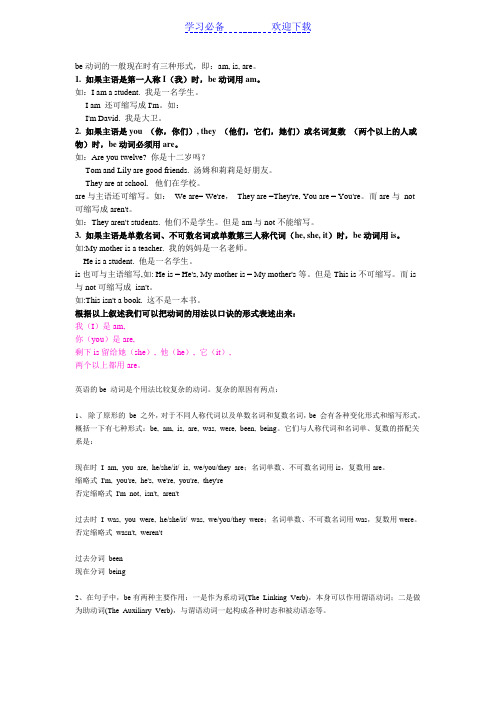
be动词的一般现在时有三种形式,即:am, is, are。
1. 如果主语是第一人称I(我)时,be动词用am。
如:I am a student. 我是一名学生。
I am 还可缩写成I'm。
如:I'm David. 我是大卫。
2. 如果主语是you (你,你们), they (他们,它们,她们)或名词复数(两个以上的人或物)时,be动词必须用are。
如:Are you twelve? 你是十二岁吗?Tom and Lily are good friends. 汤姆和莉莉是好朋友。
They are at school. 他们在学校。
are与主语还可缩写。
如:We are= We're,They are =They're, You are = You're。
而are与not可缩写成aren't。
如:They aren't students. 他们不是学生。
但是am与not不能缩写。
3. 如果主语是单数名词、不可数名词或单数第三人称代词(he, she, it)时,be动词用is。
如:My mother is a teacher. 我的妈妈是一名老师。
He is a student. 他是一名学生。
is也可与主语缩写,如: He is = He's, My mother is = My mother's等。
但是This is不可缩写。
而is 与not可缩写成isn't。
如:This isn't a book. 这不是一本书。
根据以上叙述我们可以把动词的用法以口诀的形式表述出来:我(I)是am,你(you)是are,剩下is留给她(she), 他(he), 它(it),两个以上都用are。
英语的be 动词是个用法比较复杂的动词。
复杂的原因有两点:1、除了原形的be 之外,对于不同人称代词以及单数名词和复数名词,be 会有各种变化形式和缩写形式。
be动词的一般现在时有三种形式

be动词的一般现在时有三种形式,即:am, is, are。
1. 如果主语是第一人称I(我)时,be动词用am。
如:I am a student. 我是一名学生。
I am 还可缩写成I'm。
如:I'm David. 我是大卫。
2. 如果主语是you (你,你们), they (他们,它们,她们)或名词复数(两个以上的人或物)时,be动词必须用are。
如:Are you twelve? 你是十二岁吗?Tom and Lily are good friends. 汤姆和莉莉是好朋友。
They are at school. 他们在学校。
are与主语还可缩写。
如:We are= We're,They are =They're, You are = You're。
而are与not可缩写成aren't。
如:They aren't students. 他们不是学生。
但是am与not不能缩写。
3. 如果主语是单数名词、不可数名词或单数第三人称代词(he, she, it)时,be 动词用is。
如:My mother is a teacher. 我的妈妈是一名老师。
He is a student. 他是一名学生。
is也可与主语缩写,如: He is = He's, My mother is = My mother's等。
但是This is 不可缩写。
而is与not可缩写成isn't。
如:This isn't a book. 这不是一本书。
根据以上叙述我们可以把动词的用法以口诀的形式表述出来:我(I)是am,你(you)是are,剩下is留给她(she), 他(he), 它(it),两个以上都用are。
[思路分析]be作助动词用的形式如下:①am, is, are, was, were②助动词+be:shall be, will be, can be, etc.③have/has/had + been(完成时)④am, is, …being(进行时)[解题过程](1)表达进行时态句型be + V-ing…(进行时态)例:What are you reading?(你正在阅读什么?)I am reading a magazine.(我正在阅读杂志。
be动词的基本用法

be动词的⼀一般现在时有三种形式,即:am, is, are。
1. 如果主语是第⼀一⼈人称I(我)时,be动词⽤用am。
如:I am a student. 我是⼀一名学⽣生。
I am 还可缩写成I'm。
如:I'm David. 我是⼤大卫。
2. 如果主语是you (你,你们), they (他们,它们,她们)或名词复数(两个以上的⼈人或物)时,be动词必须⽤用are。
如:Are you twelve? 你是⼗十⼆二岁吗?Tom and Lily are good friends. 汤姆和莉莉是好朋友。
They are at school. 他们在学校。
are与主语还可缩写。
如: We are= We're, They are =They're, You are = You're。
⽽而are与 not可缩写成aren't。
如:They aren't students. 他们不是学⽣生。
但是am与not不能缩写。
3. 如果主语是单数名词、不可数名词或单数第三⼈人称代词(he, she, it)时,be动词⽤用is。
如:My mother is a teacher. 我的妈妈是⼀一名⽼老师。
He is a student. 他是⼀一名学⽣生。
is也可与主语缩写,如: He is = He's, My mother is = My mother's等。
但是This is不可缩写。
⽽而is与not可缩写成 isn't。
如:This isn't a book. 这不是⼀一本书。
根据以上叙述我们可以把动词的⽤用法以⼝口诀的形式表述出来:我(I)是am,你(you)是are,剩下is留给她(she), 他(he), 它(it),两个以上都⽤用are。
[思路分析]be作助动词⽤用的形式如下:①am, is, are, was, were②助动词+be:shall be, will be, can be, etc.③have/has/had + been(完成时)④am, is, ⋯being(进⾏行时)[解题过程](1)表达进⾏行时态句型 be + V-ing⋯(进⾏行时态)例:What are you reading?(你正在阅读什么?)I am reading a magazine.(我正在阅读杂志。
be动词的一般现在时有三种形式
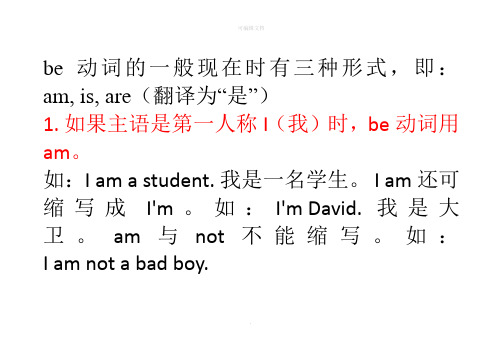
be动词的一般现在时有三种形式,即:am, is, are(翻译为“是”)1. 如果主语是第一人称I(我)时,be动词用am。
如:I am a student. 我是一名学生。
I am 还可缩写成I'm。
如:I'm David. 我是大卫。
am 与 not 不能缩写。
如:I am not a bad boy..2. 如果主语是we(我们),you (你,你们), they (他们,它们,她们)或名词复数(两个以上的人或物)时,be动词必须用are。
如:Are you twelve? 你是十二岁吗?Tom and Lily are good friends. 汤姆和莉莉是好朋友。
They are at school. 他们在学校。
are与主语还可缩写。
.如: We are= We're, They are =They're, You a re = You're。
而are与 not可缩写成aren't。
如:They aren't students. 他们不是学生。
3. 如果主语是单数名词、不可数名词或单数第三人称代词(he, she, it)时,be动词用is。
如:My mother is a teacher. 我的妈妈是一名老师。
He is a student. 他是一名学生。
is也可与主语缩写,.如: He is = He's, My mother is = My mother's 等。
但是This is不可缩写。
而is与not可缩写成 isn't。
如:This isn't a book. 这不是一本书。
4. 句中含有be动词的陈述句变一般疑问句。
把be动词提到句首,be动词要变大写。
注意第一人称变第二人称。
回答时用yes或no表示,结构:Yes, 主语+be动词,No,主语+be动词+not。
如:It is a book. 变为:.Is it a book?5. 句中含有be动词的肯定陈述句变否定句。
be动词的时态变化
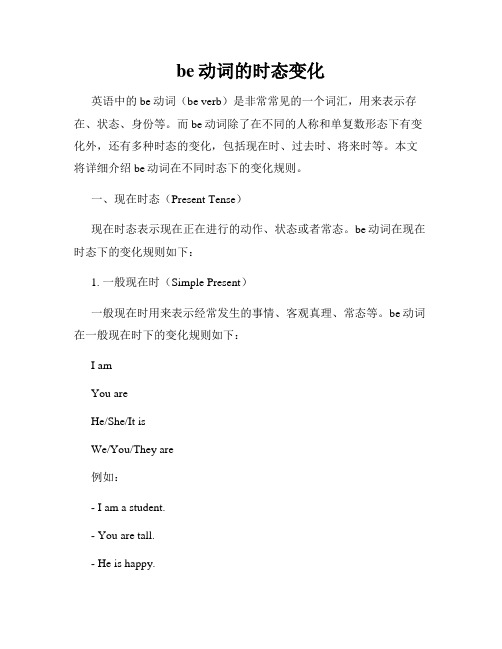
be动词的时态变化英语中的be动词(be verb)是非常常见的一个词汇,用来表示存在、状态、身份等。
而be动词除了在不同的人称和单复数形态下有变化外,还有多种时态的变化,包括现在时、过去时、将来时等。
本文将详细介绍be动词在不同时态下的变化规则。
一、现在时态(Present Tense)现在时态表示现在正在进行的动作、状态或者常态。
be动词在现在时态下的变化规则如下:1. 一般现在时(Simple Present)一般现在时用来表示经常发生的事情、客观真理、常态等。
be动词在一般现在时下的变化规则如下:I amYou areHe/She/It isWe/You/They are例如:- I am a student.- You are tall.- He is happy.2. 现在进行时(Present Continuous)现在进行时用来表示现在正在进行的动作。
be动词在现在进行时下的变化规则如下:I am beingYou are beingHe/She/It is beingWe/You/They are being例如:- I am studying.- You are watching TV.- He is writing a letter.3. 现在完成时(Present Perfect)现在完成时用来表示过去发生的动作对现在的影响。
be动词在现在完成时下的变化规则如下:I have beenYou have beenHe/She/It has beenWe/You/They have been例如:- I have been to France.- You have been busy.- He has been sick.二、过去时态(Past Tense)过去时态表示过去发生的动作或者存在的状态。
be动词在过去时态下的变化规则如下:1. 一般过去时(Simple Past)一般过去时用来表示过去发生的动作或存在的状态。
be动词的一般现在时有三种形式1
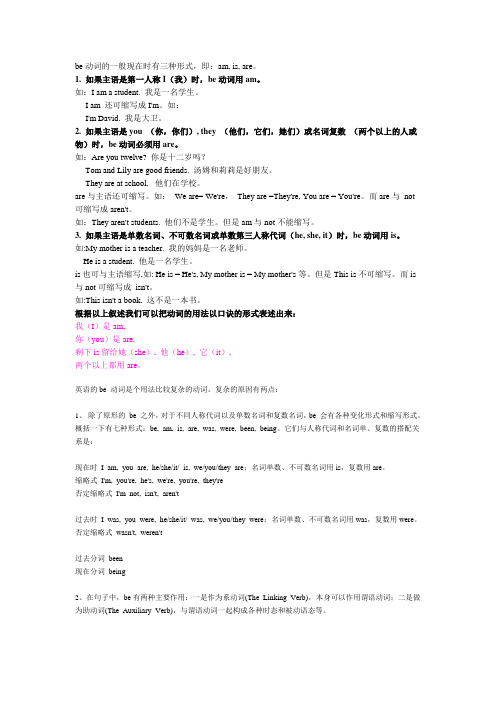
be动词的一般现在时有三种形式,即:am, is, are。
1. 如果主语是第一人称I(我)时,be动词用am。
如:I am a student. 我是一名学生。
I am 还可缩写成I'm。
如:I'm David. 我是大卫。
2. 如果主语是you (你,你们), they (他们,它们,她们)或名词复数(两个以上的人或物)时,be动词必须用are。
如:Are you twelve? 你是十二岁吗?Tom and Lily are good friends. 汤姆和莉莉是好朋友。
They are at school. 他们在学校。
are与主语还可缩写。
如:We are= We're,They are =They're, You are = You're。
而are与not可缩写成aren't。
如:They aren't students. 他们不是学生。
但是am与not不能缩写。
3. 如果主语是单数名词、不可数名词或单数第三人称代词(he, she, it)时,be动词用is。
如:My mother is a teacher. 我的妈妈是一名老师。
He is a student. 他是一名学生。
is也可与主语缩写,如: He is = He's, My mother is = My mother's等。
但是This is不可缩写。
而is 与not可缩写成isn't。
如:This isn't a book. 这不是一本书。
根据以上叙述我们可以把动词的用法以口诀的形式表述出来:我(I)是am,你(you)是are,剩下is留给她(she), 他(he), 它(it),两个以上都用are。
英语的be 动词是个用法比较复杂的动词。
复杂的原因有两点:1、除了原形的be 之外,对于不同人称代词以及单数名词和复数名词,be 会有各种变化形式和缩写形式。
be动词的一般现在时

Be 动词的常用句型
1.肯定句,主语+be 动词+其他 He is a student.
2.否定句,主语+be 动词+not+其他 He is not a student.
be动词加not的缩写:is not=isn't are not= aren't 3.一般疑问句,be 动词+主语+其他?
Is he a student? 回答:Yes,he is.\No, he isn't. 4.特殊疑问句,特殊疑问词+be 动词+主语+其他 What is your name?
Be 动词的一般现在时(am,is are)
1.am 第一人称单数 I e.g I am a techer.
2.is第三人称单数 he, she, it e.g He is a doctor. She is a nurse. It is a dog.
3.are 其他人称 we,they, you e.g We are doctors. They are nurses. You are a good girl.
Who is Lily in this photo?
practice
• 一、根据句子写出be动词的正确形式。 1、They (are)from Beijing. 2、It ( is )an orange. 3、I ( am)Chinese. 4、She ( is ) playing the piano. 5、You ( are )so beautiful to me.
二、把下列句子变成相应的句型。 They are all from America. 一般疑问句: Are they all from America?
be动词的使用方法

4. Tom and LianreTao _____ good
friends.
is
5.The dog _____nks for your attention!
Be动词的使用 方法
魏钢
be动词的一般现在时有三 种形式, 即:am, is, are。
1. 如果主语是第一人称I(我) 时,be动词用am。
如:I am a student. 我是一名 学生。
I am 还可缩写成I'm。如:
I'm David. 我是大卫。
2. 如果主语是you (你,你们), they (他 们,它们,她们)或名词复数 (两个以上的 人或物)时,be动词必须用are。
3. 如果主语是单数名词、不可数名词 或单数第三人称代词(he, she, it) 时,be动词用is。
如:My mother is a teacher. 我的妈 妈是一名老师。
He is a student. 他是一名学生。
is也可与主语缩写,如: He is = He's, My mother is = My mother's等。但 是This is不可缩写。而is与not可缩 写成 isn't。
如:Are you twelve? 你是十二岁吗?
Tom and Lily are good friends. 汤姆和莉 莉是好朋友。
They are at school. 他们在学校。
are与主语还可缩写。如: We are= We're, They are =They're, You are = You're。而 are与 not可缩写成aren't。
be动词的一般现在时有三种形式1
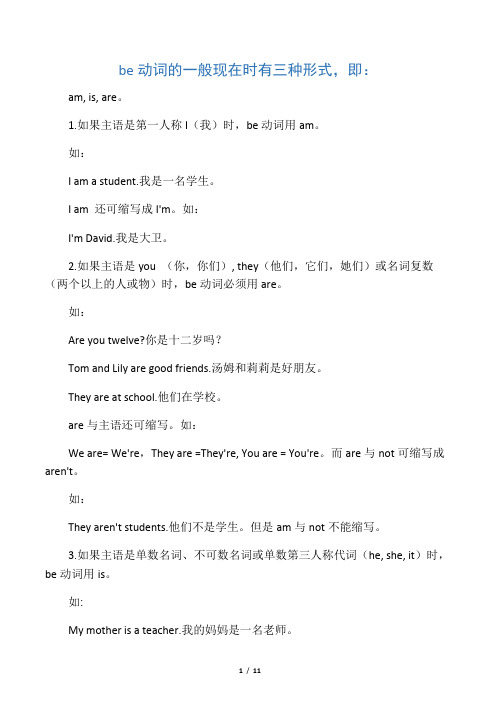
C.was;are
D.were;was
4.____your father at work the day_____yesterday?
A.Was;before
B.Is;before
C.Was;after
D.Is;after
5.Who was on duty last Friday?____.
Tom and his friends are not in the park.
You were not nine years old when I went to the university.
He was not often late for his class when he was a student.
be
am, is, are。
1.如果主语是第一人称I(我)时,be动词用am。
如:
I am a student.我是一名学生。
I am还可缩写成I'm。如:
I'm David.我是大卫。
2.如果主语是you(你,你们), they(他们,它们,她们)或名词复数(两个以上的人或物)时,be动词必须用are。
剩下is留给她(she),他(he),它(it),
两个以上都用are。
英语的be动词是个用法比较复杂的动词。复杂的原因有两点:
1、除了原形的be之外,对于不同人称代词以及单数名词和复数名词,be会有各种变化形式和缩写形式。
概括一下有七种形式:
be,am,is,are,was,were,been,being。它们与人称代词和名词单、复数的搭配关系是:
1、系动词+表语”的结构
当be动词做系动词使用时,主要构成“系动词+表语”的结构,在句子中做谓语。表语可以是名词、形容词、副词、介词短语等。例如:
be动词的基本用法

be动词的⼀一般现在时有三种形式,即:am, is, are。
1. 如果主语是第⼀一⼈人称I(我)时,be动词⽤用am。
如:I am a student. 我是⼀一名学⽣生。
I am 还可缩写成I'm。
如:I'm David. 我是⼤大卫。
2. 如果主语是you (你,你们), they (他们,它们,她们)或名词复数(两个以上的⼈人或物)时,be动词必须⽤用are。
如:Are you twelve? 你是⼗十⼆二岁吗?Tom and Lily are good friends. 汤姆和莉莉是好朋友。
They are at school. 他们在学校。
are与主语还可缩写。
如: We are= We're, They are =They're, You are = You're。
⽽而are与 not可缩写成aren't。
如:They aren't students. 他们不是学⽣生。
但是am与not不能缩写。
3. 如果主语是单数名词、不可数名词或单数第三⼈人称代词(he, she, it)时,be动词⽤用is。
如:My mother is a teacher. 我的妈妈是⼀一名⽼老师。
He is a student. 他是⼀一名学⽣生。
is也可与主语缩写,如: He is = He's, My mother is = My mother's等。
但是This is不可缩写。
⽽而is与not可缩写成 isn't。
如:This isn't a book. 这不是⼀一本书。
根据以上叙述我们可以把动词的⽤用法以⼝口诀的形式表述出来:我(I)是am,你(you)是are,剩下is留给她(she), 他(he), 它(it),两个以上都⽤用are。
[思路分析]be作助动词⽤用的形式如下:①am, is, are, was, were②助动词+be:shall be, will be, can be, etc.③have/has/had + been(完成时)④am, is, ⋯being(进⾏行时)[解题过程](1)表达进⾏行时态句型 be + V-ing⋯(进⾏行时态)例:What are you reading?(你正在阅读什么?)I am reading a magazine.(我正在阅读杂志。
be动词的一般现在时形式
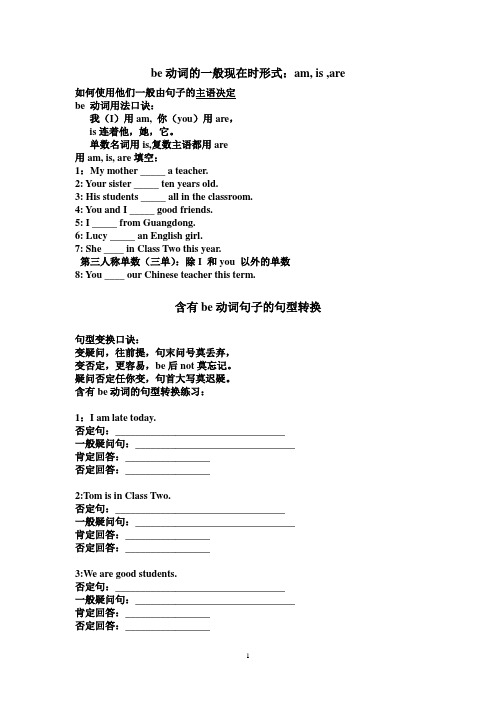
be动词的一般现在时形式:am, is ,are如何使用他们一般由句子的主语决定be 动词用法口诀:我(I)用am, 你(you)用are,is连着他,她,它。
单数名词用is,复数主语都用are用am, is, are填空:1:My mother _____ a teacher.2: Your sister _____ ten years old.3: His students _____ all in the classroom.4: You and I _____ good friends.5: I _____ from Guangdong.6: Lucy _____ an English girl.7: She ____ in Class Two this year.第三人称单数(三单):除I 和you 以外的单数8: You ____ our Chinese teacher this term.含有be动词句子的句型转换句型变换口诀:变疑问,往前提,句末问号莫丢弃,变否定,更容易,be后not莫忘记。
疑问否定任你变,句首大写莫迟疑。
含有be动词的句型转换练习:1:I am late today.否定句:__________________________________一般疑问句:________________________________肯定回答:_________________否定回答:_________________2:Tom is in Class Two.否定句:__________________________________一般疑问句:________________________________肯定回答:_________________否定回答:_________________3:We are good students.否定句:__________________________________一般疑问句:________________________________肯定回答:_________________否定回答:_________________4: I am drawing a picture.否定句:__________________________________一般疑问句:________________________________肯定回答:_________________否定回答:_________________用适当的be动词填空1. I ______a boy. ______ you a boy? No, I _____ not.2. The girl _______ Jack’s sister.3. _______ your brother in the classroom?4. Who _______ I?5. The jeans _______ on the desk.6. There _______ a girl in the room.7. My sister's name _______ Nancy.8. There _______ some apples on the tree.9. There _______ a boy, two girls, three men and ten women in the park.10. The dog______ tall and fat.I am = I’myou are = you’rehe is = he’sshe is = she’sit is = it’swe are = we’reyou are = you’rethey are = they’re◆主谓缩写原则即be动词与作主语的名词或代词缩写。
英语中英语be动词的一般现在时

英语中英语be动词的一般现在时一般现在时表示经常、习惯性发生的动作。
be动词的一般现在时有am,is,are三种形式,由主语的人称和数来决定用哪一种。
be动词一般现在时的否定句句型:主语+be动词的一般现在时(am,is,are)+not+…,例:肯定句:I am afraid of dogs.否定句:I am not afraid of dogs.肯定句:She is a good teacher.否定句:She is not a good teacher.肯定句:They are in the park.否定句:They are not in the park.一般疑问句的结构句型:Be动词的一般现在时(Am/Is/Are)+主语+…..?,例:1. Am I flying a kite? Yes, you are. / No, you aren't2. Is she reading books? Yes, she is. / No, she isn't3. Are they doing their homework? Yes, they are. / No, they aren't一般疑问句的回答在回答由be动词构成的一般疑问句时,要用Yes或No,句型如下:肯定回答Yes, 主语+be动词否定回答No, 主语+be动词+not,例:A: Is your key on the table? B: Yes, it is. / No, it isn'tA: Are you at home? B: Yes, I am. / No, I'm not.be动词一般现在时的特殊疑问句1.特殊疑问句的结构,句型:疑问句+be动词+主语+….? 例:What is this? 这是什么?What are they? 他们是干什么的?Who is he? 他是谁?2.特殊疑问句的回答,特殊疑问句不能用yes或no来回答。
be动词的一般现在时

3.一般疑问句,be 动词+主语+其他?
Is he a student?
回答:Yes,he is.\No, he isn't.
4.特殊疑问句,特殊疑问词+be 动词+主语+其他
What is your name?
整理ppt
2
பைடு நூலகம்
Who is Lily in this photo?
practice
•一、根据句子写出be动词的正确形式。 1、They (are)from Beijing. 2、It ( is )an orange. 3、I ( am)Chinese. 4、She ( is ) playing the piano. 5、You ( are )so beautiful to me.
整理ppt
4
此课件下载可自行编辑修改,此课件供参考! 部分内容来源于网络,如有侵权请与我联系删除!感谢你的观看!
They are nurses.
You are a goo整d理gppitrl.
1
Be 动词的常用句型
1.肯定句,主语+be 动词+其他
He is a student.
2.否定句,主语+be 动词+not+其他
He is not a student.
be动词加not的缩写:is not=isn't are not= aren't
Be 动词的一般现在时(am,is are)
1.am 第一人称单数 I
e.g I am a techer.
2.is第三人称单数 he, she, it
e.g He is a doctor.
用be动词造句
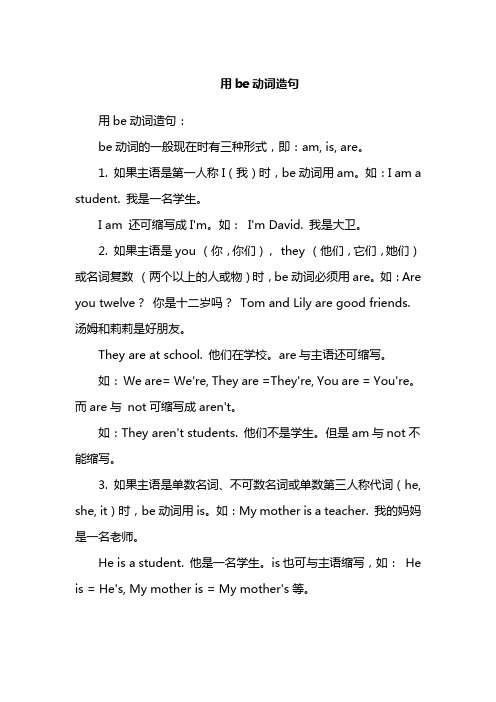
用be动词造句
用be动词造句:
be动词的一般现在时有三种形式,即:am, is, are。
1. 如果主语是第一人称I(我)时,be动词用am。
如:I am a student. 我是一名学生。
I am 还可缩写成I'm。
如:I'm David. 我是大卫。
2. 如果主语是you (你,你们),they (他们,它们,她们)或名词复数(两个以上的人或物)时,be动词必须用are。
如:Are you twelve?你是十二岁吗?Tom and Lily are good friends. 汤姆和莉莉是好朋友。
They are at school. 他们在学校。
are与主语还可缩写。
如:We are= We're, They are =They're, You are = You're。
而are与not可缩写成aren't。
如:They aren't students. 他们不是学生。
但是am与not不能缩写。
3. 如果主语是单数名词、不可数名词或单数第三人称代词(he, she, it)时,be动词用is。
如:My mother is a teacher. 我的妈妈是一名老师。
He is a student. 他是一名学生。
is也可与主语缩写,如:He is = He's, My mother is = My mother's等。
- 1、下载文档前请自行甄别文档内容的完整性,平台不提供额外的编辑、内容补充、找答案等附加服务。
- 2、"仅部分预览"的文档,不可在线预览部分如存在完整性等问题,可反馈申请退款(可完整预览的文档不适用该条件!)。
- 3、如文档侵犯您的权益,请联系客服反馈,我们会尽快为您处理(人工客服工作时间:9:00-18:30)。
Be动词的一般现在时
句型:
肯定句
否定句
疑问句
1、be动词的意义
Mary is a student. He is at school.
I am a teacher. She is beautiful. She is very beautiful.
2、否定句
肯定:It is a book. → 否定:It is not a book. /It isn’t a book.
I am a student. → I am not a student. /I’m not a student.
You are my friend. →You are not my friend. /You aren’t my friend.
She is my sister.
These are apples.
I am Mary’s deskmate.
他们是我的同班同学。
这本书很有趣。
3、一般疑问句
肯定:I am a student. →一般疑问:Are you a student?
She is from China. Is she from China?
They are nurses.
My book is on the table.
John 是中国人吗?
这本书有趣吗?
回答一般疑问句时,主语必须是代词
4、特殊疑问句(特殊疑问词: what, who, which, where, when, why, how)
What is this? It is a table.
What are they? They are workers.
Who are they? They are my friends.
这个男人是谁?他是我的哥哥。
你的哥哥是干什么的?他是一名医生。
5、there is/are句型
1)There is a book on the table.
There is the book on the table.
There is a bed in this room.
There are many eggs in the kitchen.
2)there 的意思
There is a school there.
6、there is/are的否定句与疑问句
1)一般疑问句
______ ________ many eggs in the kitchen? 厨房里有很多鸡蛋吗?
______ ________ a middle school there? 哪里有一所学校吗?
2)特殊疑问句
How mach ink is there in the ink bottle? There is only a little.
What’s on the table? There are some boxes on it.
你们家里有几口人?有五口人。
碗里有什么?有米饭。
7、Here 的句型
1)Here is/are 这里有……
Here you are. = Here it is.
Here is my boy.
这里有两个男孩子。
这是你的车票。
2)主语为名词时,v.在n.前;主语为代词时,v.在n.后
Here comes the teacher.
Here he comes.
公车来了。
一般动词(除be动词、助动词、情态动词外的动词)的一般现在时
一般动词的否定句和疑问句+do/does
1、主语与一般动词
1)主语为第一、二人称及所有复数形式时
2)主语为第三人称单数时
以s/x/ch/sh/o结尾的v.加-es,如:guess → guesses wash → washes tomato → tomatoes 例外:photo potato 以辅音字母加y结尾的v. 变y为i,再加-es, 如:fly → flies study → studies
2、否定句(在动词前加do not/don’t /does not/doesn’t, v.变原型)
You speak English.
He /She /It speaks English.
She is not a nurse.
I don’t like to go to school.
3、疑问句
1)一般疑问句
Does he walk to school? Do you have an exam in English?
注:have/has表“所有”时,变为否定句时,可直接在have/has后加not,变为疑问句时可直接把have/has放在句首He has two books. He has not/hasn’t/doesn’t have two books. Has he two books? = Does he have two books?
你每天都上学吗?Have you classes every day? I have not classes every day.
他每周开一次会。
2)特殊疑问句
Where do you live? Do you live here?
他怎么上学?他是坐公车上学的吗?
如果对主语提问:Who looks after the baby?
谁住在这里?
一般现在时的用法
1、常发生的动作或存在的状态
He goes to work every day. He teaches Chinese.
2、普遍真理
The earth is round. Birds fly in the sky.
3、有些表示心理状态或感情的v.
I want you help. I don’t think you’re right.
4、在时间、条件状语从句中表将来
If it doesn’t rain tomorrow, we’ll go to the Summer Palace.
5、表示已经预先计划或安排的肯定将要发生的动作(come, go, start, begin, leave, return, stop等瞬间v.)
Next week they leave for Shanghai.
6、其他
Here comes Li Ming.= Li Ming is coming.
Here he comes. = He is coming.
(注:文档可能无法思考全面,请浏览后下载,供参考。
可复制、编制,期待你的好评与关注!)。
